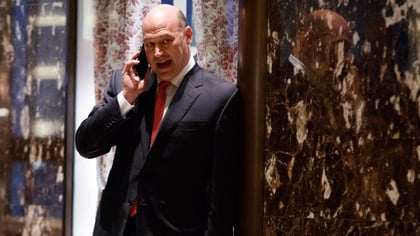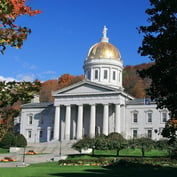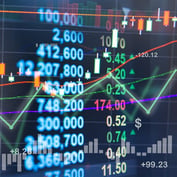The loss of Gary Cohn as a stabilizing force in the White House administration and the rise of protectionist hawks poses a risk to U.S. bank stocks and other equities tied to the housing market, analysts say.
Strategists are assessing who may replace Cohn as Donald Trump’s top economic adviser and who else may depart, as well as the potential for policy changes that may hurt lenders, affect interest rates and housing trends, and lead to a more hard-line approach in trade talks.
The KBW Bank index has gained 50 percent since Trump’s 2016 election victory on tax cuts and prospects for lighter regulation, both championed by Cohn.
The index fell 0.5 percent in early Wednesday trading, with Cohn’s former employer Goldman Sachs Group Inc. sinking as much as 1.8 percent. Bank of America Corp. lost 1.7 percent, and JPMorgan Chase & Co. fell 1.6 percent.
Cowen, Chris Krueger and Jaret Seiberg
Cohn’s departure means “Wall Street just lost its security blanket,” Krueger writes. Cowen can’t think of anyone who can fill the NEC seat who’d give “Wall Street as much comfort as Cohn — particularly with the protectionists on the rise and tariffs top of the agenda.” Krueger also flags a “recruitment deficit,” as “incredibly high-profile and prestigious finance jobs” are unfilled.
Seiberg flags short-term worries focused on trade, which may affect the economy, and longer-term fear that more conservative influence in the West Wing may mean policies that will hurt the biggest banks, such as reinstating Glass-Steagall and increasing leverage capital requirements. A trade war might influence demand for Treasuries and affect interest rates, or trigger a recession, “which is always negative for housing and financials.”
Seiberg sees Larry Kudlow as the lead replacement candidate; other candidates may include Vice President Mike Pence’s economist Mark Calabria, Rep. Jeb Hensarling, Prof. Marvin Goodfriend, former BB&T executive John Allison, economist Kevin Hassett and trade adviser Peter Navarro — with Navarro, Allison or Hensarling as worrying for financial companies.
UBS, Keith Parker
An escalation of trade frictions isn’t in UBS’s baseline case, “and thus is a risk to our positive view, with protectionism a headwind for productivity growth and S&P margins.” Parker sees a swinging trade pendulum and greater uncertainty.
Investors are now assessing the prospects for retaliation and actions against China, while NAFTA negotiations continue. Even so, UBS reminds investors that the impacts of steel and aluminum tariffs (about $10 billion cost) “pale in comparison” to a Border Adjustment Tax of 20 percent on all imports (about $600 billion cost) that was pushed by Republicans early last year.
Raymond James, Ed Mills
Cohn’s departure “will undoubtedly be viewed as a negative event from a market perspective, as he was viewed as a stabilizing force within in the Trump administration,” and his tenure at Goldman “provided considerable gravitas for many investors.”
Mills sees the rise of anti-trade voices, like Navarro, as an immediate concern and is watching for who else may depart the administration.
“The market could see significant concern if there were departures of high-profile cabinet members, such as Secretary of Defense Mattis, Secretary of State Tillerson or Treasury Secretary Mnuchin. These seem unlikely at this time, but any chatter on additional departures would keep folks on high alert.”
Compass Point, Isaac Boltansky
Cohn’s departure suggests “Trump’s aggressive posture on trade issues – including NAFTA and China – will only harden in the months ahead”.
Such a move “will undoubtedly exacerbate the market’s recent trepidation,” and may further delay the “painfully slow pace” of appointing financial services nominees for posts at the Federal Reserve, as well as the Federal Housing Administration commissioner.









 March 07, 2018 at 02:50 PM
March 07, 2018 at 02:50 PM











